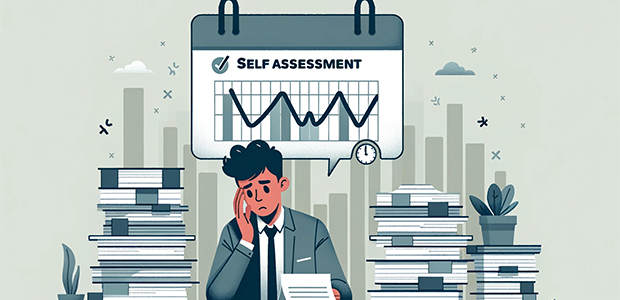
Taxing Times: Survey Uncovers the Psychological Toll of Self Assessment on UK SMEs
A first-of-its-kind experiment by Intuit QuickBooks has shed light on the impact of Self Assessment on the health of UK small business owners.
As the 31st of January deadline for Self Assessment tax returns approaches, small business owners and sole traders nationwide are busy with preparations. Intuit QuickBooks' nationwide survey data shows that nearly a third (30%) of these individuals have experienced mental health impacts due to the process, with over a fifth (22%) reporting physical health effects. Alarmingly, more than half (54%) have questioned their business-running capabilities because of Self Assessment.
To delve deeper into the psychological effects of Self Assessment, Intuit QuickBooks commissioned a study using biometric data. Conducted by Dr Chris Brauer of Goldsmiths, University of London, along with researchers from Symmetry, the experiment unveiled the hidden strains Self Assessment imposes on UK sole traders and SMB owners. Key findings include:
- Self Assessment significantly affects the wellbeing of SMB owners, often underestimated by participants themselves. Stress levels surge by an average of 56%, with peaks of 85% when recalling the Self Assessment process.
- The stress of filing tax returns is comparable to life's most stressful events, eliciting responses as intense or more intense than other major life stressors.
- The process hampers productivity, with stress levels spiking by 60% during the information and paperwork gathering phase. This anxiety disrupts focus on other work aspects.
- Confidence in business operations is undermined, and avoidance behaviors emerge, as discussing Self Assessment heightens stress by 53%.
- Intervention from the tech and accounting sectors can alleviate stress. The prospect of assistance from accountants or technology solutions offers relief, though the lack of clear guidance remains a stressor. More proactive support from these sectors can mitigate the pressure.
In tandem with biometric data, the study also employed the Big Five personality model from neuroscience research, identifying three distinct personality types with varying reactions to the Self Assessment process:
- Precarious Procrastinators: Require assistance in maintaining order and structure. Low self-esteem leads to procrastination or delays in handling Self Assessment.
- Determined Doers: Similar need for structured support, but higher self-esteem means they face less frustration and are more motivated to complete the process.
- Confident Completers: Proficient in managing orderly processes. High self-esteem ensures comfort and confidence in the outcome, provided the process is clear and well-defined.
Dr Chris Brauer, Goldsmiths, University of London comments: “Being an entrepreneur or self-employed demands a lot of self-discipline, resilience, grit and determination. But small business owners can’t exercise these personality traits or manage their stress if they don’t understand the source. This study reveals the hidden toll Self Assessment and managing accounts takes on our small business owners and equips them with the tools to do things differently so they can focus on what’s really important.”
Pauline Green, Head of Product Compliance & Programmes at Intuit QuickBooks UK comments: “The stress and anxiety that comes with completing a Self Assessment is clearly very real. Different people will experience and act on this differently, but the process need not adversely impact the health and performance of SMBs and sole traders.
More education and training can play a vital role in reducing the triggering nature of tax returns. At the same time, there is lots of sound advice and guidance out there and we urge all those completing Self Assessment or any other financial process to seek out support.”

